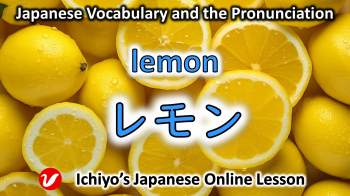The Japanese vocabulary「レモン (remon)」means “lemon.” Please learn the pronunciation and the example sentences.
Japanese Vocabulary and the Meaning
If you do not know why the cell with “Hiragana” is blank, please read this page.
| Key Word | レモン |
| Hiragana | |
| Romaji Reading | remon |
| English Meaning | lemon |
The Correct Japanese Pronunciations
Please learn the pronunciation by watching the attached video. You can also learn example sentences.
Our main YouTube channel: Ichiyo’s Japanese YouTube Channel
Our sub-YouTube channel (Japanese vocabulary videos): Ichiyo’s Subchannel
The Example Japanese Sentences
It is important to have skills in both non-honorific and honorific languages in order to use Japanese correctly.
I’ll squeeze lemon.
Plain Form:
レモンを搾る。
Remon o shiboru.
Polite Form:
レモンを搾ります。
Remon o shiborimasu.
I made a lemon cocktail.
Plain Form:
レモンのカクテルを作った。
remon no kakuteru o tsukutta.
Polite Form:
レモンのカクテルを作りました。
remon no kakuteru o tsukurimashita.
I’ll watch a video about candied lemons.
Plain Form:
レモンの砂糖漬けの動画を見る。
Remon no satōzuke dōga o miru.
Polite Form:
レモンの砂糖漬けの動画を見ます。
Remon no satōzuke dōga o mimasu.
Lemon juice got in my eyes and it hurts.
Plain Form:
レモンの汁が目に入って痛い。
Remon no shiru ga me ni haitte itai.
Polite Form:
レモンの汁が目に入って痛いです。
Remon no shiru ga me ni haitte itai desu.
I floated lemon slices in the glass.
Plain Form:
レモンの輪切りをグラスに浮かべた。
Remon no wagiri o gurasuni ukabeta.
Polite Form:
レモンの輪切りをグラスに浮かべました。
Remon no wagiri o gurasuni ukabemashita.
I don’t like the sourness of lemon.
Plain Form:
レモンの酸味が苦手だ。
Remon no sanmi ga nigateda.
Polite Form:
レモンの酸味が苦手です。
Remon no sanmi ga nigatedesu.
I put a little bit of lemon juice in my tea. (Past Tense)
Plain Form:
紅茶にレモンの果汁を少しだけ入れた。
Kōcha ni remon no kajū o sukoshi dake ireta.
Polite Form:
紅茶にレモンの果汁を少しだけ入れました。
Kōcha ni remon no kajū o sukoshi dake iremashita.
I baked lemon-flavored pancakes for breakfast.
Plain Form:
朝食にレモン風味のパンケーキを焼いた。
Chōshoku ni remon-fūmi no pankēki o yaita.
Polite Form:
朝食にレモン風味のパンケーキを焼きました。
Chōshoku ni remon-fūmi no pankēki o yakimashita.
Adding lemon to the dish made it vibrant.
Plain Form:
レモンを添えたら料理が華やかになった。
Remon o soetara ryōri ga hanayaka ni natta.
Polite Form:
レモンを添えたら料理が華やかになりました。
Remon o soetara ryōri ga hanayaka ni narimashita.
I chopped the lemon peel finely and put it in the cake.
Plain Form:
レモンの皮を細かく刻んでケーキに入れた。
Remon no kawa o komakaku kizande kēki ni ireta.
Polite Form:
レモンの皮を細かく刻んでケーキに入れました。
Remon no kawa o komakaku kizande kēki ni iremashita.

